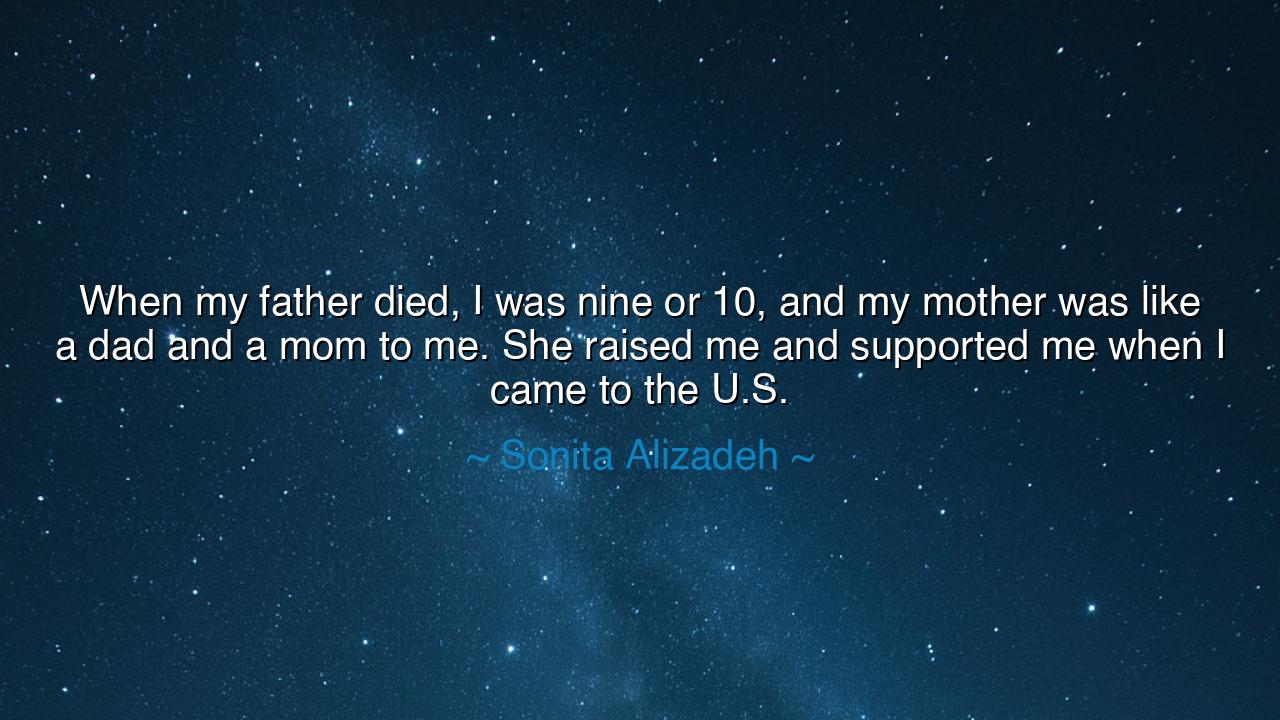
When my father died, I was nine or 10, and my mother was like a
When my father died, I was nine or 10, and my mother was like a dad and a mom to me. She raised me and supported me when I came to the U.S.






In the heartfelt words of Sonita Alizadeh, the young poet and voice of resistance, we hear a story that transcends her own life: “When my father died, I was nine or ten, and my mother was like a dad and a mom to me. She raised me and supported me when I came to the U.S.” Within these words burns the light of resilience, sacrifice, and the eternal strength of motherhood. It is the voice of one who has walked through loss and found within it not despair, but the power of rebirth. It is also the story of millions who have been carried forward by the unseen hands of mothers—those quiet warriors who bear the weight of both love and duty, often without recognition.
The origin of this quote lies in Sonita’s journey from the shadows of Afghanistan, where her childhood was shaped by war and the threat of child marriage, to a life of freedom in the West. When her father passed away, the pillars of her world seemed to crumble, yet one remained—the figure of her mother, who became both father and mother, protector and nurturer, guardian and guide. In the ancient traditions, this dual role was seen as nearly divine, for it required a balance of tenderness and strength, of heart and hand. Through her mother’s courage, Sonita learned that the essence of parenthood is not bound by gender, but by sacrifice and love.
The image of the mother who becomes both parents is one that has echoed through history. In the annals of time, there are countless examples of such indomitable spirits. Consider Cornelia Africana, the Roman matron and mother of the Gracchi brothers. Widowed young, she raised her sons with virtue and intellect, shaping them into reformers who would one day challenge the Senate of Rome. When praised for her jewels, she pointed instead to her sons and said, “These are my jewels.” Like Sonita’s mother, Cornelia embodied the sacred truth that a mother’s strength does not end when the father is gone—it multiplies. She becomes the bridge between past and future, holding together what loss has tried to scatter.
In Sonita’s words, we also hear the echo of migration and rebirth. When she speaks of being supported in her journey to the United States, we see not merely the act of travel, but the triumph of courage. To leave one’s homeland is to tear a piece of the soul from its roots, yet her mother did not falter. Like the mothers of old who guided their children through deserts and wars, she faced the unknown so that her daughter might inherit possibility. Such a mother does not only raise a child—she raises a destiny. And through Sonita’s art, her music, and her advocacy, the mother’s spirit continues to breathe in every word.
The ancients would have called such a woman a keeper of fate. In the myths of many lands, when gods withdrew, it was always the mothers who kept the flame alive—Demeter searching for Persephone, Hagar leading her son through the desert, or the nameless peasant women who carried their children through storms and famines. These mothers remind us that strength is not loud; it is steadfast. It does not boast of what it endures; it simply endures. In their arms, the world finds its renewal.
The lesson of Sonita’s story is clear: never underestimate the power of love that stands in the face of loss. The one who gives life may also be the one who saves it, and the one who endures suffering with grace becomes a living symbol of hope. Her words teach us that family is not only a matter of structure but of spirit—that when one pillar falls, another may rise taller in its place. And within that act of rising lies the nobility of humanity itself.
To the children of hardship, Sonita’s story whispers: do not let grief make you small. Remember those who carried you when the world was heavy. To the mothers and fathers who must play both roles, it proclaims: your labor is sacred, your love eternal. And to all who listen, it offers this timeless truth—from pain is born strength, and from love, endurance.
Therefore, let every heart that hears her words give thanks for the unseen guardians in their lives. For behind every life that shines, there stands a soul—like Sonita’s mother—who once refused to let the flame go out. And as long as that spirit endures, humanity will never be without hope, for love such as this is the very light by which the world survives.






AAdministratorAdministrator
Welcome, honored guests. Please leave a comment, we will respond soon